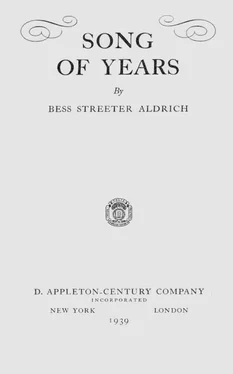It was fully an hour later that Jeremiah rode away with a parting: “Well, you sleep over this and you’ll come to see it rightly. I’ll warrant, come daylight, you’ll see the light and throw in your weight with the Sturgis Falls folks and help hang onto the court records there.”
He had been gone across the prairie only long enough to be a toy man on a toy horse when Wayne saw a pair of bays and a shining buggy coming across the open spaces.
Only a few times had he seen Cady Bedson and now here the fellow was, but for what purpose?
“Looks like we better get ready to serve afternoon tea . . . so many callers, Ed,” Wayne said, as the two saw the team making for them.
Right after Jeremiah Martin’s agitated visit, it was not taking Wayne five minutes to see the reason for this other call.
“Watch the sparks fly, Ed. I just don’t have any extra liking for this lad.”
“How are you, Lockwood?” Cady Bedson was affable enough.
“I can’t complain.”
“Nice farm you’ll have some day.”
“That’s what I thought the day I picked it out,” he answered dryly.
Cady laughed. Evidently he was in no mood to quarrel.
“Land settling up in fine shape through here. Some of these days all the land will be taken in the whole new county.”
“I agree. But I doubt if I’m going to agree to do what you’re out here to get me to promise.”
“Why, what’s that?”
“I guess you’re here to get me to pull for a change in the county-seat all right.”
“I hadn’t mentioned that, had I?”
Wayne grinned. “No . . . and now you won’t even need to.”
Why did he dislike him so—his slick looks and his dapper little mustache and his oily affability? Just one of those things you could not understand. “I Just don’t like him and I’m of no mind to try,” he said to Ed, after Cady was gone.
Ed Armitage laughed at Wayne and his complete about-face on the subject of the court-house site so that Wayne laughed too.
“Yes, I guess I’m committed to a decision now.” Queer that the dislike of a personality was what had convinced him. That was what you would call being prejudiced for a certainty. How Jeremiah Martin and the girls would laugh when he told them what had decided him to stand by Sturgis Falls.
He would have a chance to tell them the next day, too, for there was to be preaching in the log school-house and Emily had asked him to dinner between sessions. Some Brother Osgood, an itinerant preacher, was to arrive at the Martins’ and hold service both morning and afternoon.
Sunday turned out to be a rare jewel of a day set in the necklace which October was wearing. The little log schoolhouse was crowded. Saddle horses and those hitched to lumber wagons, buckboards and two-wheeled carts, were tied to trees at the rear, so that during the long sermon Jeremiah figuratively cut and set two dozen hitching-posts in front of the school grounds already worn bare in spots by hi-spy and ante-over games.
Brother Osgood, a shriveled brown gnome of a man, preached in droning flat tones from an Old Testament text, but also covered decisively, if sketchily, the subjects of baptism, conversion, punishment, redemption, prayer, and predestination, while mothers slipped sprigs of caraway to their offspring to smell in order to keep them awake, and surreptitiously took a whiff themselves betimes.
It was a most auspicious occasion for Suzanne to dream, lulled as she was by the monotonous tones of Brother Osgood. For time unending the voice mumbled through her consciousness like the bumbling of a far-off bee.
Jeremiah was nodding into his black beard, jerking up and looking about him indignantly. Sarah’s thin sharp face under its black bonnet was upturned to the speaker, her heavy red hair sagging down from its pins, and her lips pursed as though she was trying to keep herself from a snapping retort to the little man’s orthodoxy. Henry and Phineas were outside the door, half glad that their late arrival was keeping them there.
Sabina and Tom Bostwick were holding hands surreptitiously under the edge of Sabina’s gray shawl. Emily was pleating her black mitts in nervous fingers, planning the dresses from Aunt Harriet’s box. Jeanie rolled her dark eyes under her green bonnet from Sam Phillips to George Wormsby and even toward the pedantic Ambrose Willshire in impartial and regular sequence.
Phoebe Lou, sitting with the Mansons, looked a little self-conscious over the proximity of Ed Armitage. Melinda, gazing out of the window whose open wooden shutters revealed the vast stretches of prairie, was far afield on one of those journeys she was always sighing to take. Celia’s head under her white straw bonnet was bent decorously low. To the casual observer Celia was in a state of pious worshiping, her pretty face carrying an expression which was dutifully reverential. But the casual observer could not have known that Miss Celia had a broken piece of mirror in her white cotton mitt and was gazing therein quite as fascinated by what she saw as Narcissus at the pool.
It is not to be wondered at that Suzanne, in her half-dreaming state, seeing all these familiar figures as through a veil, for one brief moment lost consciousness of where she was, so that when a late fall fly lighted on her hand, trained as she was to be fly-conscious, she started up suddenly from her bench, thinking to get the long-handled brush, only to drop back onto the seat in deepest mortification when she realized that this was “meeting,” that every one was glaring at her, and that Wayne Lockwood from across the room was grinning at her discomfiture.
And now almost to every one’s surprise, as though they were not quite sure it could ever end, the morning session was over. There remained only an announcement, a song, and the benediction. The announcement was that there would be a sermon again at two-thirty which would contain something of the lives of the major prophets at the close of which a collection would be the order of the day. The song was sung, pushed along by Sabina’s and Wayne’s strong voices and held back by a dozen unmusical ones. The benediction, which Mr. Noah Webster’s American Dictionary of the English Language said was a short prayer with which public worship was closed, proved to be all that Mr. Webster had said of it excepting that it was not short. It was very long, indeed, so that it was going to hurry the women folks to get dinner and the dishes done in time to get back to the afternoon preaching.
Because of the lateness of the hour there was not the usual loitering to visit as on most occasions when the settlers got together. This time it was the women who tugged at men’s sleeves, instead of the usual, “Come, come, you women never know when to stop talking.” For most of the men wanted to talk to the old trapper, Rab Dorwit, who in regular frontier clothes and coonskin cap with tail down the back, had returned to the Valley to see what it looked like under modern conditions.
The man had roamed through this section fifteen years before, trapping and fishing, living with the Indians at first, later in a hastily constructed log hut by the river. He was not at all the Jeremiah Martin type of settler coming into Iowa to make a permanent home, belonging instead, to that other period, the era of the transient—an old man now who had been one with the beavers and the pike and the antelope, free as the prairie winds or any wild thing of the river or forest, finding these modern modes of living too settled.
Already Jeremiah was asking the old trapper to come over to dinner, so that Melinda said to her mother: “For goodness sakes, let’s get Pa home before he asks the whole congregation.”
Sarah had sent Celia and Suzanne ahead to get the table set and now added: “Melinda, get the fire going up under the chicken. I’ll be along as fast as I can come. Now scoot!”
Читать дальше












